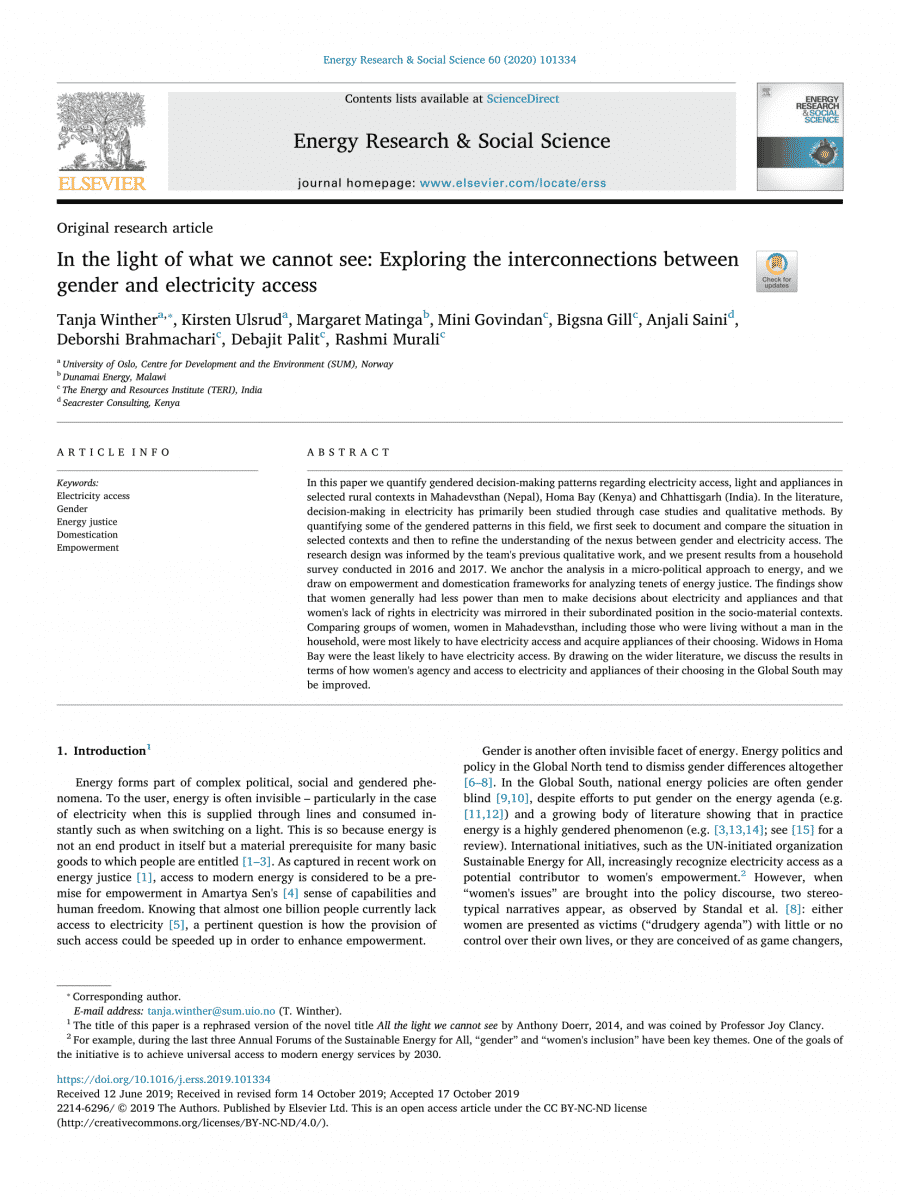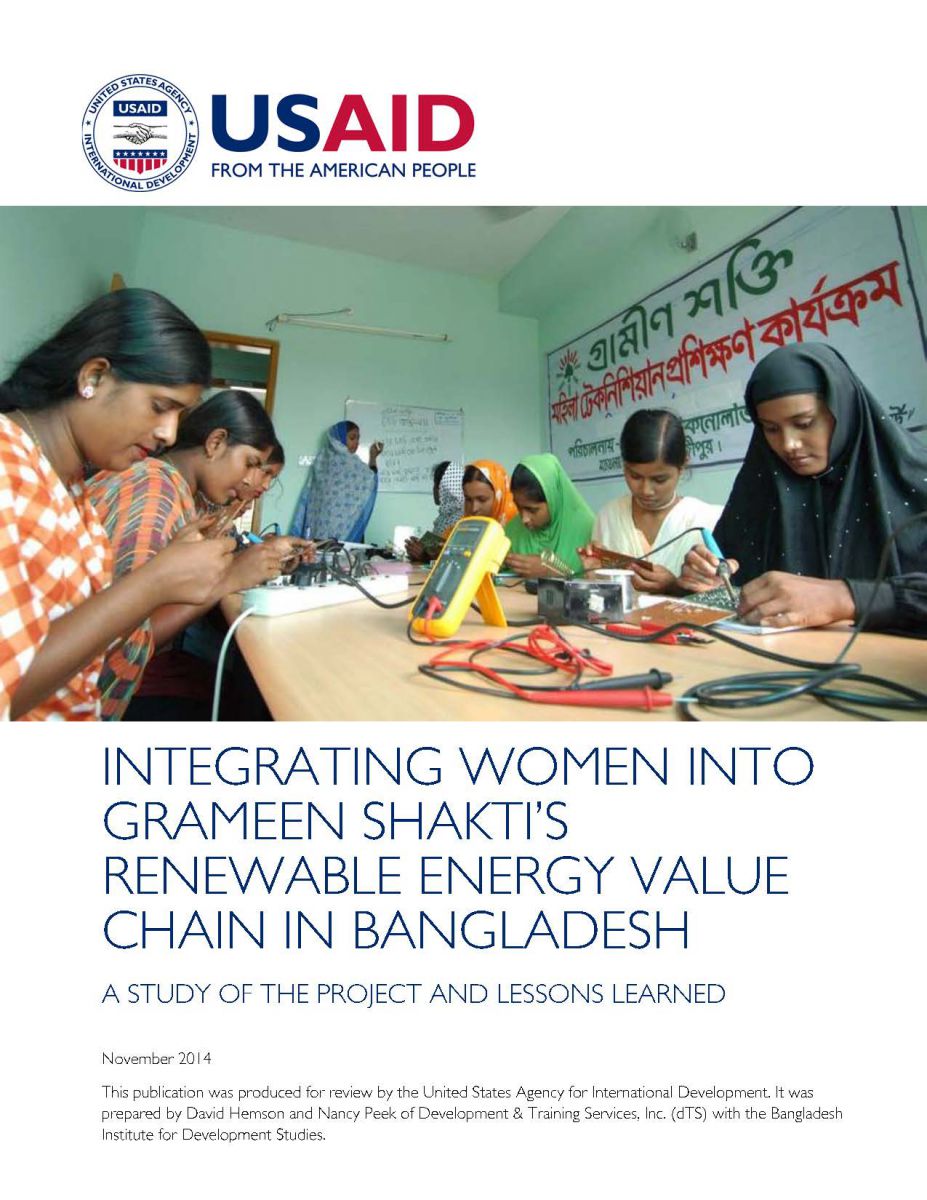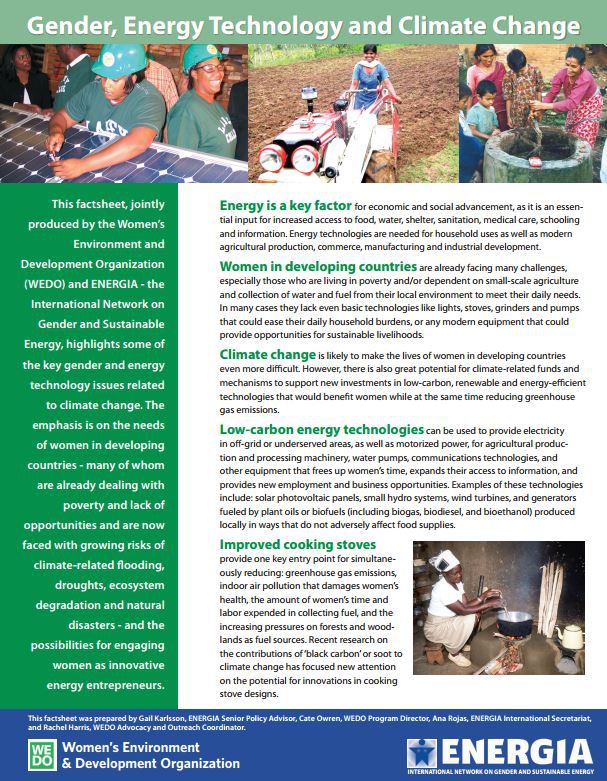Archives: Documents
-
The ENERGIA Gender and Energy Research Programme: A short overview of the results
In this ENERGIA News you will find evidence and highlights from the Gender and Energy Research programme, in which ENERGIA has worked, since 2014, with nine teams of researchers in 12 countries. This research programme has built an evidence base to support informed policy making to decrease gender inequalities in energy access and benefits of…
-

Access to electricity for all and the role of decentralized solar power in sub-Saharan Africa
Several hundred million people in sub-Saharan Africa are at risk of being without access to electricity by 2030 despite the ongoing work aimed at achieving the United Nations’ Sustainable Development Goal 7—sustainable energy for all. Based on qualitative interviews, quantitative surveys, observation, and participation in Kenya and Senegal between 2010 and 2018, the author aims…
-

Gender dynamics and solar electricity: lessons from Tanzania
-

Gender and Equity Compact for the Energy and Mineral Development Sector 2016/2017 – 2019/2020
As Uganda strives to become a middle-income country by 2020, the Energy and Mineral Development sector plays a crucial role as a key driver of economic growth and industrialization. To contribute to industrialization and economic growth, the Energy sub-sector is obliged to increase electricity generation and transmission, to expand development and access to sustainable energy…
-

Gender and Energy: Opportunities for All
The global drive to provide universal access to sustainable and modern energy by 2030 is creating numerous opportunities for energy users and suppliers. However, men and women do not benefit equally from these opportunities. Women’s contribution to energy planning, supply, and policymaking is limited, as the energy sector is heavily dominated by men. Therefore, universal…
-

Women for Sustainable Energy – Strategies to Foster Women’s Talent for Transformational Change
GWNET’s first study “Women for Sustainable Energy – Strategies to Foster Women’s Talent for Transformational Change” contains an overview of women’s current participation in the sustainable energy workforce in developed and emerging economies, the benefits of diversity and inclusion in the workplace, industry interviews, good practice examples and recommendations for a more gender-diverse sector.
-

In the light of what we cannot see: Exploring the interconnections between gender and electricity access
In this paper we quantify gendered decision-making patterns regarding electricity access, light and appliances in selected rural contexts in Mahadevsthan (Nepal), Homa Bay (Kenya) and Chhattisgarh (India). In the literature, decision-making in electricity has primarily been studied through case studies and qualitative methods. By quantifying some of the gendered patterns in this field, we first…
-
Policy Brief: The benefits of involving women in energy system supply chains
Women’s involvement in energy supply chains has advantages for the acceleration of access to modern energy services, for the women involved and for their families. In energy supply roles in rural communities, women perform as well as men and in some cases even outperform them. Opening up the prospects of business and jobs in a…
-
Policy Brief: Why energy access and gender equality are inextricably linked
The Sustainable Development Goal 7 (SDG7)’s ambitious mandate to ensure access to modern energy for all will only be reached if gender is taken into account. ENERGIA’s Gender and Energy Research programme has found evidence on the differences between women and men in their energy needs, both in the household and in business, and in…
-

Integrating Women into Grameen Shakti’s Renewable Energy Value Chain in Bangladesh: A Study of the Project and Lessons Learned
This assessment report considers gender equality and women’s empowerment in Bangladesh, and covers a study focused on the USAID-funded Rural Empowerment through Renewable Energy project. This 15-day technological training for rural women in Bangladesh helped to integrate women into the Grameen Shakti (or GS, the leading renewable energy company in the country) renewable energy value…
-

Gender, Energy Technology and Climate Change
This factsheet, jointly produced by the Women’s Environment and Development Organization (WEDO) and ENERGIA – the International Network on Gender and Sustainable Energy, highlights some of the key gender and energy technology issues related to climate change. The emphasis is on the needs of women in developing countries – many of whom are already dealing…

